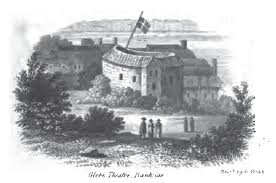Today Professor Grace Ioppolo was quoted in the Hackney Citizen in an article by Daniel Baird:
It may take another 400 years but Shoreditch and Shakespeare may eventually be coupled in the global consciousness in the same way that his star-crossed lovers are today.
Last month planning permission was granted to build on the site of a Jacobean theatre that was uncovered on Curtain Road in 2008. A six-storey development will bring what was once profoundly known as the Theatre to life, hosting plays in a new guise.
A second theatre from the period, the Curtain, was also excavated locally last year. Hackney Council will consider the proposal for the site at a committee meeting next month.
Outlining the significance of these finds, Heather Knight from the Museum of London Archaeology says: “These buildings saw the first performances of plays such as Romeo and Juliet and Henry V to name only two, so to have found any trace of one these buildings would have been extremely important but to have found evidence of both is remarkable.
“The post-excavation analysis for the Theatre is only in its infancy and the site of the Curtain has not yet been fully excavated but already we know so much more about these buildings than we did five years ago.
“The site of the Curtain and the site of the Theatre will give archaeologists, historians and lovers of Shakespeare and early drama new insights into how these buildings were used, who used them and how the physical space of these two early playhouses influenced the writing and performance of plays.”
Professor Grace Ioppolo from the University of Reading says that the landmarks would represent “a rich part of cultural heritage and a great way to regenerate and celebrate the neighbourhood”.
Professor Ioppolo describes the wild success that these sites saw in the late 16th century: “The Theatre and the Curtain seem to have been quite profitable. They were too popular for their own good. They attracted so many people it caused a huge ruckus.
“Theatre attracted cut-purses, people who cut your purse off the side of your belt, and prostitutes. It also encouraged people to skip work or key state celebrations. It was always a very exciting place to see plays.”
Some local residents are concerned that the current proposal for the Curtain complements neither the area’s contemporary aesthetics nor its history.
The proposed scheme for the site, excavated last year, comprises of a new theatre, offices, a 40-storey tower block and gardens.
Whilst doubt and debate remains over the form that a new landmark should take, all parties are largely in agreement that these sites should suitably commemorate the borough’s history.
“Modern theatre was born in Hackney,” says Professor Ioppolo. “It’s the most central and earliest place for theatre production. We tend to think of the South Bank as the origin of theatre but it wasn’t, it was the north part of the city.”

